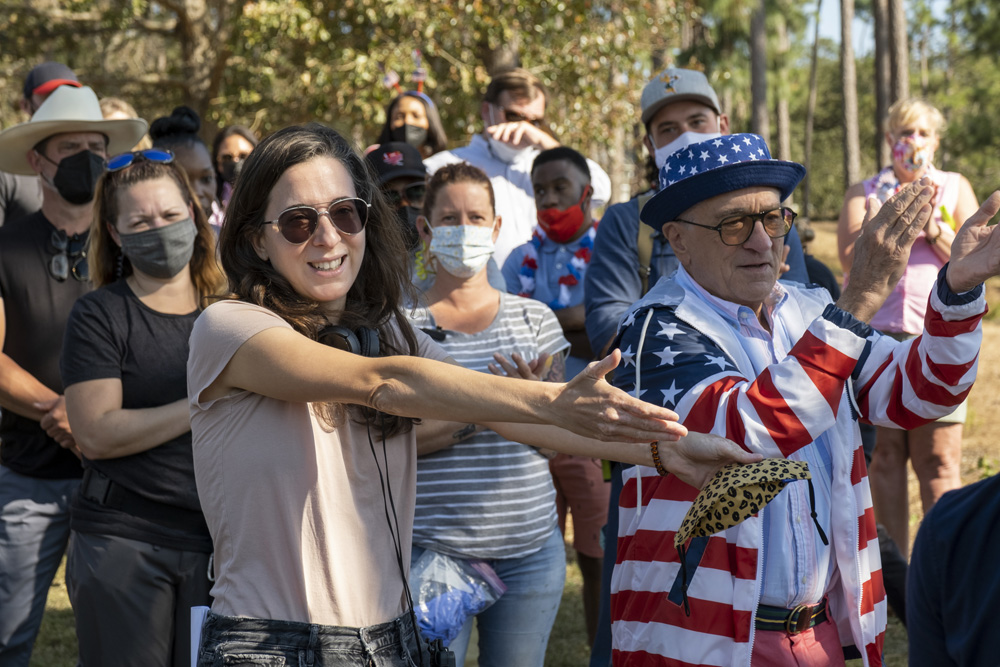At the start of “About My Father,” there were always more than geographic considerations in getting the family history of its star Sebastian Maniscalco, who plays a thinly veiled version of himself in the film, from Sicily to Chicago in a matter of minutes. In fact, time wasn’t that much of an issue when the quick-witted comedian wouldn’t waste a breath in sharing memories of how his forebearers enjoyed sun-dappled summers on the magical island before his father saw in opportunity in America that started with shoveling snow, but to get across not only where he came from, but where he got his sense of humor, director Laura Terruso asked her lead to open his family’s photo albums.
“We really dug deep and got all that archival and it’s very much Sebastian’s story,” says Terruso. “This [story in the film] has been his experience in meeting and marrying his wife Lana, so there’s so much truth and authenticity to the material that of course we would just pull directly from his life. And actually one of those family photos is my family, my Sicilian family.”
The opening credits set the tone for the fast, funny and surprisingly poignant “About My Father,” though one should expect nothing less from Terruso. Since pairing Greta Lee and Wyatt Cenac as married authors on their way to an artists retreat in her delicious debut feature “Fits and Starts,” the filmmaker has seen the potential for the buddy comedy to show how people can help one another grow, subsequently reinventing the stoner movie with “Good Girls Get High” as overachievers Abby Quinn and Stefanie Scott let loose on their last night before high school graduation and turning the dance competition film “Work It” into a story of celebration of what occurs when people from all different backgrounds fuse together their talent.
From a poster for “About My Father,” one think they know what they’re getting with Maniscalco facing off with a gruff-looking Robert De Niro, but from the film, it’s evident that things might not be what they appear at first with the “Midnight Run” star sporting a ponytail as Salvo, a beloved hairdresser who has tended to the needs of his clientele as tenderly as his son since the passing of his wife and is called on to offer some support when Maniscalco’s Sebastian is ready to ask the parents (Kim Cattrall and David Rasche) of his girlfriend Ellie (Leslie Bibb) for their permission to propose. They may be intimidating, with one a sitting U.S. senator and they live on palatial private property, but over the Fourth of July weekend, there are as many fireworks on the ground as there are in the sky when it’s Sebastian’s feelings of insecurity that come to the fore when like his father a generation before, he finds himself contemplates how much he should assimilate to the culture he finds himself in or remaining true to the person he was as he tries to find common ground with Ellie’s family, including her two brothers Lucky (Anders Holm) and Doug (Brett Dier), with the former eager to inherit the clan’s hotel business and the latter a peacenik who wants as few possessions as possible.
Sebastian may struggle to balance the different demands made of him as he pursues Ellie’s hand in marriage, but Terruso has no such trouble segueing between broad comic set pieces and heartfelt moments that arise organically from his experience, eliciting dynamic performances from her cast and showing a keen instinct for knowing how to capture the emotional essence of a scene. With “About My Father” opening in theaters across the country this week, the filmmaker spoke about how she won the job that she might not have initially appeared as the obvious choice for, finding a personal connection with Manascalco and the material and how she stays stylistically spry, including a new foray into the nonfiction space with a forthcoming performance film.
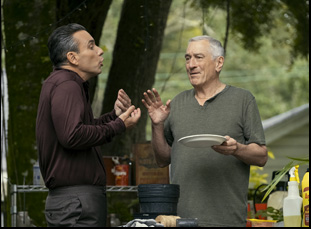
Yeah, we were finishing post on “Work It” and we were officially in lockdown for COVID, so I was doing sound mixing and color work from home on my iPad or TV, which actually made sense because that movie was for a streamer. And my agent sent me this script with the caveat, “Hey, you’re Italian, check this out.” [laughs] And I read it and I connected with it so much because Sebastian and I have lived these parallel lives in many ways. We’re both the children of Sicilian immigrants — his father’s from Sicily and my mother’s from Sicily and she immigrated in the 1960s. So did his father. And we both found our way to Los Angeles and to comedy, so while on the surface we seem very different — and we are very different — I like to think that we’re cut from the same cloth despite being very different garments.
When I read the script, I immediately just felt such a connection to the material and I knew [the producer] Andrew Miano from Depth of Field since I’d met with him previously, [so I said], “Dude, I’ve got to pitch on this” and then it became about launching a campaign as to why I should be the director. It was a competitive situation where a lot of people wanted the job, and I remember Andrew being like, “Yeah, it’s you and a couple of guys [with] a lot of experience.” So I was like, “Just you wait.” [laughs] I put together a really in-depth presentation about not only my personal connection to the material, but how I saw the film [because] with these studio movies, you have to make the film before you make the film and really be able to walk the studio and the producers and through every piece of the filmmaking and how you see every little part of it so that they can really get a sense of “This is her vision for the film. This is why she’s passionate about it and this is how she’s going to treat certain scenes.”
So in the pitch, there were certain scenes like the tennis scene where I had just such a clear vision for how I wanted to shoot that, what music I wanted to accompany that scene, hand ow I wanted that scene to look and feel, that I was able to bring to the presentation and I think that was the moment where I saw Sebastian go, “Hmm, okay.” He liked the take. And thankfully, I got the job and the rest is history. And at that point, De Niro was not signed on, but once I got the job that we sent the script to was Robert De Niro, and I basically gave him the same presentation and talked him through why I felt so connected material, and why I was making the movie and how I saw it with all those same beats that I walked Sebastian through.
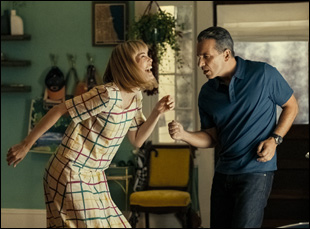
Yeah, that’s a testament to Sebastian and Austen Earl, his co-writer. The script was so funny when I got it and so well-written, so a lot of that was baked in. I really responded to that because I love films where the comedy is coming from character and all the characters were so unique. I got to work on the script as well a little bit with the guys and the Doug character was one that I feel very proud of because I was like, “Hey, you’ve got Lucky, who’s this staunch capitalist. Let’s have Doug be the exact opposite — let’s play with that because that feels real.” And all of these actors are at such a level [where] everybody was just on the top of their game and so ensconced in their character and what their character was experiencing at any given time that by the time we got to set, it was just so fun to watch these incredible actors play together. When we would get into a rehearsal, I was like giddy like a school girl. It’s just like, this is so cool because they’re all just so, so good.
And I feel Sebastian proves that he is a leading man in this film. He really does have star quality and he and Bob played so seamlessly with one another. And that’s hard [when] he’s with someone who’s at the top of his game [like De Niro] and Sebastian’s literally just started acting, but there he is and in reading the script, I always knew that it was the Salvo character that was the character that really changes [Sebastian’s] character. Ultimately, this is a romantic comedy about a father and a son — it’s a two-hander, so they both experience catharsis in different ways. But when I read the script, I was so drawn to the character of Salvo and just how rich that character was and is. Having my mother be from somewhere else and understanding the toll that that takes and always feeling like you’re one foot in, one foot out, I really felt like I got that character deeply and I knew that it would attract an actor of the caliber of Robert De Niro.
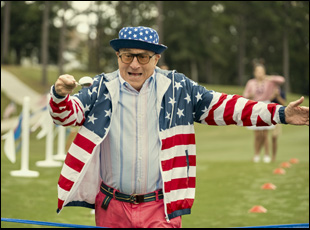
With Bob there, everything is about authenticity and grounding the comedy. This is not an “Ace Ventura”-style film. This is a very grounded film that happens to be very comedic and I learned as we were filming that Sebastian is just such an incredible dramatic actor as well as being an extraordinary physical comedian, so the paint brushes I was able to use were really different. In one scene, I’d be pulling from the dramatic paint kit and then in another, I’d be pulling from a much broader physical comedic paint kit, so it all works together and by the end of the film, you hopefully have that experience where you’re like, “Oh, I’ve been laughing all along, and then, oh my God, I’m suddenly moved,” and it all works in sync.
I’ve heard Sebastian say that you knew more Italian than he did…
Yeah, it was really fun. Everybody was so game to play and it was such an open group of actors. I was throwing out Italian words here and there. Bob was totally taking them and running with them, so it really did feel like the perfect cast for this movie.
You wouldn’t know it from the film, but is it true you shot during hurricane season?
Yeah, we were in Mobile, Alabama in the fall of 2021. And when I first got there to prep, it was like 103° and just steamy like a sauna [where] you’d leave your house and you’d just immediately be drenched in sweat. Then in September and October when we started filming, it was hurricane season and it rained and this is a 4th of July, summer holiday movie. Everything is outdoors, and in an ideal world, sun-drenched, but it rained every day and after the first week, we used up all our cover sets [where it was like] okay, if it rains, we’re going to go inside. All those [scenes] in the bedroom were shot out in the first week, so we were really like, “Man, we need some sun,” but it happens that way. I know somebody who shot something there in the spring and had a completely different experience. But it was a beautiful city, and the people were so kind. Everybody was so excited to have a film shooting there, and it was some of the best food ever.
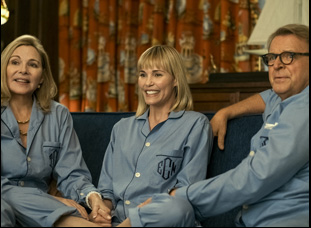
Yeah, our production designer is Javiera Varas, and she is an absolute genius. When I met with her, she had such a clear vision for what this house and world should look and feel like. [The family] has all these eclectic items — there’s like this presentational horn that’s just hanging out in the living room — and it’s so authentic and true to what that family’s home would look like. And when we were scouting locations and we got to that house, we found this guest room with that wallpaper, and immediately, I was like, “This is it. This is where the boys are sleeping. This is the room” because comedy for me very simply is the juxtaposition of opposites. You take two of the toughest Italian guys in the business right now — De Niro and Sebastian Maniscalco — and you put them in a floral wallpapered room with pink curtains, and then you’ve got comedy gold, so as soon as I walked in that room, “I’m like, this is the house.” And Javiera just built it from there. The work she did, especially bringing all that furniture and all those antiques down to Mobile, is nothing short of amazing. She’s truly a legend.
You’re staying busy these days. From what I understand, you’re actually working on your first documentary called “No Midnight”?
Yeah, it’s not really a documentary, but a performance film. During the pandemic, I started talking with Joseph Keckler, an amazing writer and artist and singer based out of New York about making a special and it was really fun because it was a return to my indie roots, and it’s something I wrote at the top of the pandemic for this is how we’re going to get back to work, so it’s been this labor of love that I’ve been working on first during the pandemic when nothing was happening and then in between all of these other Hollywood jobs, and it’s just been so wonderful and fun. I’m so inspired by Joseph’s work as a performer and writer and singer, so to get to collaborate with him and really make something experimental is one of those things that I can’t wait to show you because you have to see it to understand it. It’s constantly changing as it goes on.
“About My Father” opens on May 26th in theaters across the country.




